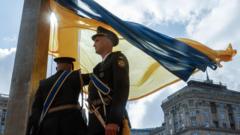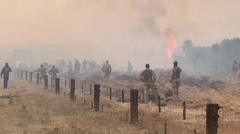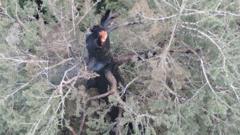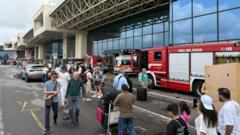Amid Ukraine's Independence Day, Russia claims Ukrainian drone strikes ignited a fire at a nuclear power facility. As support for Ukraine grows from international leaders, the conflict remains tense with both sides exchanging accusations.
Drone Strikes Blamed for Nuclear Fire as Ukraine Celebrates Independence

Drone Strikes Blamed for Nuclear Fire as Ukraine Celebrates Independence
Russia alleges Ukraine's drone attacks caused a fire at a nuclear plant amid Ukraine's Independence Day celebrations, while global leaders express support for Kyiv.
Russia has accused Ukraine of launching drone attacks that led to a fire at a nuclear power plant in the Kursk region, claiming that several energy facilities were targeted in a series of overnight incidents. Despite the rapid extinguishing of the fire, which was reported to have damaged a transformer without posing any radiation threat, tensions continue to escalate around nuclear facilities as the conflict persists.
Emergency services also responded to a blaze at Ust-Luga port in the Leningrad region, which is critical for fuel exports. The regional governor stated that around ten Ukrainian drones were intercepted, and debris from the attacks sparked the fire. As of now, Ukraine has not responded to these allegations. The International Atomic Energy Agency (IAEA) has urged both nations to exhibit restraint concerning nuclear facilities in the ongoing conflict.
The accusations and military tensions coincide with Ukraine's Independence Day celebrations, commemorating its departure from Soviet control in 1991. Canadian Prime Minister Mark Carney arrived in Kyiv to express support for President Volodymyr Zelensky. Andriy Yermak, an advisor to Zelensky, emphasized the importance of international backing on this significant day. Zelensky also shared a congratulatory letter from King Charles, praising the resilience of the Ukrainian spirit during the challenging period of war.
In a gesture of solidarity, the UK announced that Ukrainian flags would be flown above Downing Street, while British Armed Forces confirmed they would continue to train Ukrainian soldiers until at least the end of 2026 under Operation Interflex. Meanwhile, Norway pledged around 7 billion kroner (approximately $693 million) towards air defense systems for Ukraine, further highlighting the international community's support.
In recent weeks, Russia claimed to have captured two villages in eastern Ukraine, although their military advancements have been costly and minimal, currently controlling roughly 20% of Ukrainian territory following the full-scale invasion that began in February 2022. Diplomacy efforts have intensified, including a recent summit between US President Donald Trump and Russia's President Vladimir Putin. Despite claims of success from both leaders, Trump aired frustrations about the stalled peace negotiations.
Zelensky has consistently called for an unconditional ceasefire, while also accusing Russia of obstructing meaningful dialogue towards peace. In response, Russia's Foreign Minister Sergei Lavrov stated that President Putin is prepared for talks when a suitable agenda is established, blaming Ukraine for declining dialogue opportunities. As the conflict continues, the international response remains crucial for shaping the future of Ukraine and its sovereignty.


















